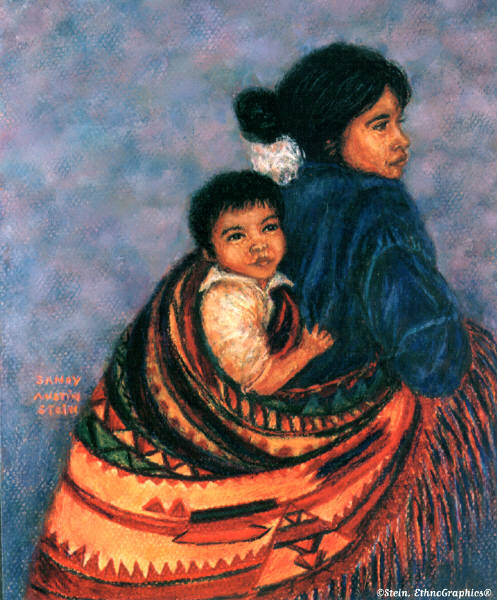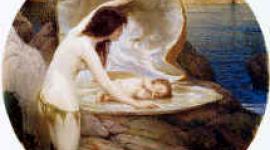Our Mother's Stories
A short essay on the importance of passing on personal and family stories to children as they provide a sense of continuity and personal history.
"What remains of a story after it is finished? Another Story..."
Eli Wiesel

Life Letters
Yesterday while I was working, my daughter, Kristen, sat beside me and began to ask one question after another about my childhood. It wasn't a good time for me to answer, and so my responses were short, vague, and distracted. Eventually she wandered off in search of a more satisfying way to occupy her time.
Finally free from her interruptions, I began working again but soon found that I had lost my ability to concentrate because of my nagging conscience. When Kristen was younger, she hounded me with questions: "How did you and Daddy meet?" "Did you get in trouble when you were a little girl?" "What did grandma do?" Not long after I answered them, she'd return with a new series of questions. She would demand that I tell her — yet again —about how her father and I had met, what games my sister and I played as children, and about how my mother would punish us. Sometimes, I felt like a wind-up doll that spewed forth the same sentences and words over and over.
continue story below
Remembering how important these stories were to her helped me to not feel too annoyed or frustrated by her seemingly endless and repetitive questions. Although my stories entertained her, they also provided her with a sense of continuity and personal history. From these tales, she learns that she is not only my daughter, but also someone's niece, grandchild, cousin, etc. Not only is our family's history a part of her, she too is adding her own chapter in our ongoing family saga. Also, by sharing tales about my family, I may occasionally provide answers to the deeper questions that she may not know how to ask.
I loved my mother's and my grandmother's stories when I was a little girl. Their vivid memories both enchanted and delighted me, and in some inexplicable way they became my stories too. One particular story still pulls at my heart decades after I first heard it.
When my mother was a child, my grandmother would stand her on the open door of the old cook stove in an attempt to warm her as she dressed her in the morning. The family was poor, and the house got so frigid during the winter that ice formed on the inside walls and froze the contents of any glasses that were left out overnight. On my mother's first day of school, she assumed her normal position on the stove door so that my grandmother could get her ready. Although my mother was filled with the excitement of embarking on the greatest adventure of her young life, she was also more than a little bit worried.
Anxiously, she asked, "Will I get to eat lunch?"
My grandmother reassured her that she would.
Although briefly comforted, my mother queried, "Will I always come home?"
Again, her mother responded affirmatively.
I have no idea how many other questions she asked or how my grandmother responded, but there was one more exchange that I'll never forget.
With wide, innocent eyes, she looked at my grandmother and asked, "Will I be able to dance at school?" My grandmother informed her, "No, you probably won't, you'll need to sit quietly and pay attention."
The little 5- year-old that would someday be my mother grew silent for just a moment and then cheerfully proclaimed, "Oh well, then I'd just better dance now!" And she began twirling around on the stove door with her little feet tapping and skinny arms held up towards the heavens. And she danced.
Sadly, I have no memories of my mother dancing. Her's has been a difficult life, even tragic in some respects. Her spirit has been repeatedly battered, and the beautiful singing voice that used to captivate me as a child eventually grew silent. Although she has no more songs for me now, she still has her stories. In my mind's eye, I still see that precious little girl transformed into a little ballerina, her wild and yet tender heart refusing to be daunted.
Today, it occurs to me that perhaps this is a significant piece of her legacy to me that is lovingly wrapped in a story that was first told me as a little girl by my grandmother. To this day, I can still hear that story whisper it's lesson to me: "Don't dwell on what you can't do, what you've lost, what you seek and have yet not found. Instead, you'd just better dance now, now while you can."
Setting aside my work, I eagerly searched for my daughter so that I could answer her questions, share our collective stories—mine, my mother's, my grandmothers', and my daughter's. She was engrossed in a telephone conversation with her best friend when I found her, and she had forgotten her questions. I'm hoping that she'll ask them again soon. She didn't last night, and I didn't press her. I learned long ago that when I miss an opportunity with Kristen it often doesn't come around again for a while. So before she went to bed last night, I turned on the music, held my arms out to her, and we danced.
APA Reference
Staff, H.
(2008, October 12). Our Mother's Stories, HealthyPlace. Retrieved
on 2026, March 4 from https://www.healthyplace.com/alternative-mental-health/sageplace/our-mothers-stories


